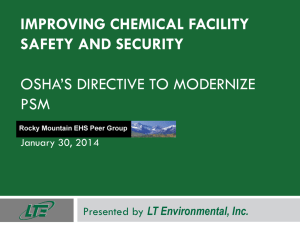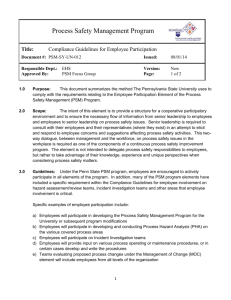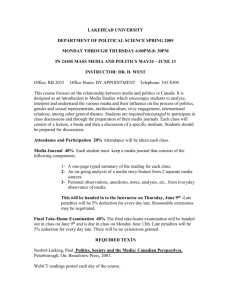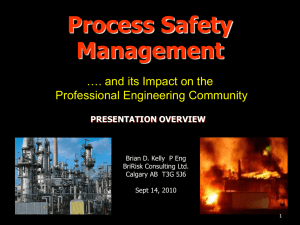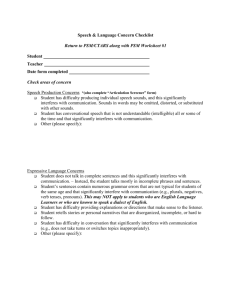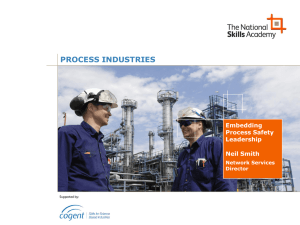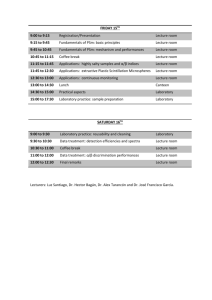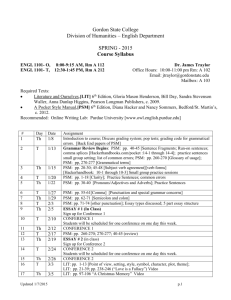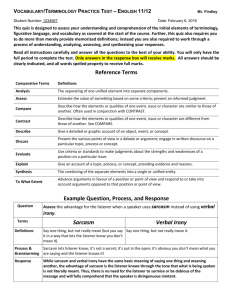Presentation Title
advertisement
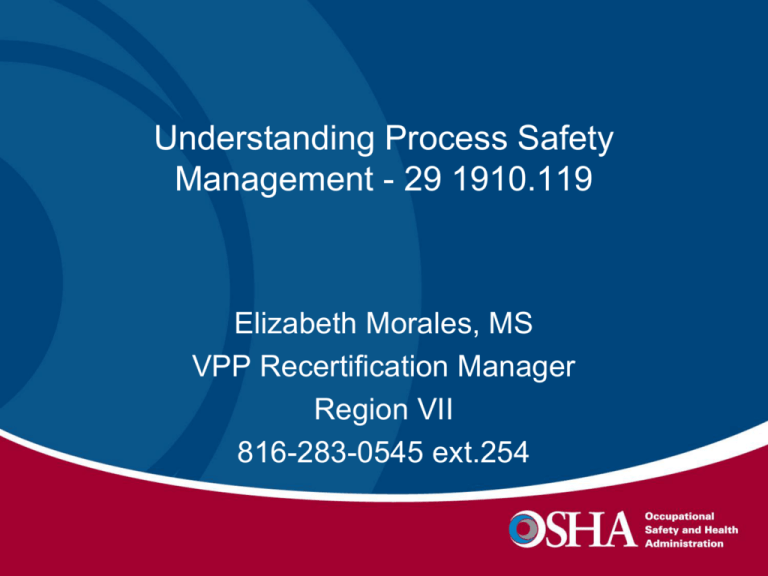
Understanding Process Safety Management - 29 1910.119 Elizabeth Morales, MS VPP Recertification Manager Region VII 816-283-0545 ext.254 Purpose: Prevent Catastrophic Releases of Highly Hazardous Chemicals Update FAT/CAT investigations • DuPont Phosgene Release at Belle, WV- A release of highly toxic phosgene resulted in one death. (Operator) Cause: Sudden rupture of a braided steel hose connected to a one-ton capacity phosgene tank releasing phosgene into the air. (January 23,2010) • Tesoro Refinery in Anacortes, WA- An explosion and fire in a Naphta hydrotreater unit in the refinery led to the fatal injury of six employees. (April 10,2010) Purpose of the PSM Standard is…. • To prevent or minimizing the consequences of catastrophic releases of chemicals such as: • Highly toxics • Reactive • Flammables • Explosives History of the PSM standard • Proposed rule was published – July 17,1990 • Final Rule was published- February 24, 1992. Final Rule Provisions 1. 2. 3. 4. 5. 6. 7. 8. Application Definitions Employee Participation Process Safety Information Process Hazard Analysis Operating Procedures Training Contractors 9. Pre-start up Safety Review 10. Mechanical Integrity 11. Hot Work Permit 12. Management of Change (MOC) 13. Incident Investigations 14. Emergency Planning 15.Compliance Audits 16.Trade Secrets What’s New with PSM? • Refinery National Emphasis Program (NEP) • Pilot Process Safety Management “Chemical NEP” OSHA Inspection Directives • CPL-2-2.45A-CH1 – Process Safety Management of Highly Hazardous Chemicals- Compliance Guidelines and Enforcement Procedures • CPL-03-00-004- Petroleum Refinery – National Emphasis Program (NEP) Refineries- National Emphasis Program Refineries- NEP • 1,000 hours/inspection • Full statutory 6 months for inspection • Human Resources intensive (OSHA & Companies) • Average Penalties/inspection~ $110,000 Refinery NEP -Update • Last update August 18,2009 • Change: To extend timeframe for completion of NEP inspections – Region VI until end of Fiscal Year 2011. Refinery NEP Most Frequently Cited PSM Elements Element Description Percentage of Total Violations F *Operating Procedures (OP) 18% J *Mechanical Integrity (MI) 17% E *Process Hazard Analysis (PHA) 17% D *Process Safety Information (PSI) 15% L Management of Change (MOC) 9% M Incident Investigation (II) 7% H Contractors 4% O Compliance Audits (CA) 4% G Operator Training 3% N Emergency Response (ER) 2% OSHA Compliance Inspection Time Frame • • PSM on-site inspections~ 6 weeks up to 6 months Time depends on many factors such as… * Size * Number of deficiencies * Violation Classifications PSM Covered Chemical Facilities National Emphasis Program-09-06(CPL PSM Covered 02) ---- CHEMICAL NEPChemical Facilities National Emphasis Program-09-06-(CPL-02) CHEMICAL NEP Chemical NEP • VPP sites are NOT subject to programmed inspections. • Applies to OSHA-wide for unprogrammed PSM related inspections: * Accidents * Complaints * Referrals * Catastrophes Chemical National Emphasis Program • Effective July 27,2009 • Different approach for inspecting PSM covered chemical facilities • NOT Comprehensive • Less resource intensive (OSHA & Employers) Chemical NEP- Pilot Program • 1 year PILOT program for planned inspections in 3 OSHA REGIONS: • Region 1- CT, MA, ME, NH, RI • Region VII- Nebraska, Kansas and Missouri • Region X- Idaho • Voluntary for State Plans Most Frequent Chemical NEP Violations PSM Standard Cited (j)(2) Description (d)(3)(ii) Mechanical Integrity procedures *RAGAGEP compliance (d)(3)(i)(B) Piping &IDs (e)(6) PHA update/revalidations (g)(2) Operator refresher training (l)(1) MOC development & implementation NEW!!! VPP –PSM requirements- New Applicants and existing sites. • New VPP-PSM applicants are required to include with their VPP application + Supplement A. • Existing VPP-PSM sites- Also are required to submit by February 15- Submit annual report + Supplement B • During onsite VPP-PSM evaluation – Supplement A & Supplement C will be use to evaluate your PSM program. Supplement A • Evaluate your PSM program. • Identify areas of excellence • **Identify areas for significant improvements • Best practices Section I. Management of Change Original Design Rate May 1992 Changes –All Safety & Health Temporary & Permanent Changes (MOC’s) Chemicals, Technology, Equipment and Procedures Section II. Relief Design MOC’s Review/Analysis of the system (Increase flow) PHA- design PSI-codes & standards Open vents & safe discharge locations Inspecting, testing, maintaining & repairing relief devices Section III. Vessels- Mechanical Integrity Type of Pressure Vessels Thickness measurement Locations (TLM) Inspections Corrosion under Insulation (CUI) Testing & Repairs Deficiencies Credentials Safety system MOC’s Section IV: Piping- Mechanical Integrity Written Piping Inspection procedures “Thickness” Documentation of thickness measurements Classification & consequences Piping inspectors welders’ qualifications Section V. Operating Procedures Normal Operating Procedures Emergency Shutdown Procedures Emergency Operations Procedures Section VI. Process Hazard Analysis, Incident investigations & audit findingsrecommendations • PHA • Incident Investigations • MOC’s • Compliance Audits ***All corrective actions must be completed in timely manner and documented. Section VII: PHA -Facility Sitting/ Human Factors • Sitting of all occupied structures- PHA • Enough time for operators to escape during an upset condition • Identify human errors and consequences of these errors. Section VIII: Operator Training • Procedures • Fully qualified to perform shutdown and emergency procedures safely • Fully trained to make difficult safe decisions in timely manner. Section IX: Safe Work Procedures • Motorized equipment to enter operating units or close to piping systems. • Opening process equipment, vessel entry, control of entrance to a facility or covered process. • Employees and contractors must follow the work practice procedures. Section X. Incident Investigations • Document all the incidents and nearmiss incidents. • Provide a detail list (1 year information) Section IX: Blowdown Drums and Vent Stacks • Documentation of the original designs if the site has blowdowns should be maintained. • Document blowdowns are discharging to a safe location. • Inspection, calibration, testing, maintenance & control documents. • Operators must be trained. VPP- PSM Recertification- What to expect? • OSHA 300 logs (three years)- Reviewed • Team Leader- Review of your PSM program • Walkthrough the facility including covered process • Review of Supplement B (annual evaluation) • Supplement A • Supplement C known as the Dynamic list of questions provided by the National Office) GENERAL INFORMATION- Supplements B, A and C • On February 15 – Every VPP –PSM site must include: Annual report + Supplement B Questionnaire. • NEW VPP-PSM SITES-required to include with their VPP Application only Supplement A. • EXISTING VPP-PSM sites-during on site visit Supplement A and C will be used. Do not forget -PSM and other interface standards • LOTO Program • Confined Space • Emergency Procedures • Respiratory Protection • Consensus Standards such as API, NFPA, and others… VPP-PSM Best Practices in Region VII • LOTO Procedures- Specific Procedures with photos. • Labeling system – big and legible tags • Mechanical Integrity Program • Contractor Safety Program • Operator training VPP - PSM Star sites • Actually, in Region VII, we only have 10 VPP-STAR sites. • Kansas - 3 sites • Missouri - 4 sites • Nebraska - 3 sites Successful PSM evaluations- TIPS!! • Promote continuous leadership development. • Employee participation • Document all significant changes in writing. • Managers & Operators are properly trained. • PSM Coordinator/ group • Solid Mechanical Integrity Program. • Avoid procrastination!! References • • • • • www. CBS.gov www.osha.gov American Petroleum Institute National Fire Protection Association www. National Geographic Special Thanks to…. PSM sites & SGE’s • • • • • • • Cargill, Blair NE Oxychem, Kansas Cargill, California,MO Butterball, Carthage, MO Omaha Steaks, Omaha,NE Kraftfoods,Kirksville,MO All SGE’s Disclamer • This information has been developed by an OSHA Compliance Assistance Specialist and is intended to assist employers, workers, and others as they strive to improve workplace health and safety. While we attempt to thoroughly address specific topics [or hazards], it is not possible to include discussion of everything necessary to ensure a healthy and safe working environment in a presentation of this nature. Please visit our webpage www.osha.gov Thanks…. End • Questions????
